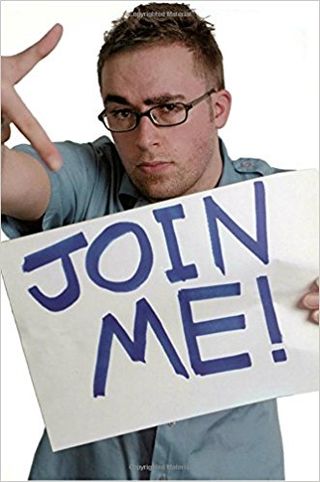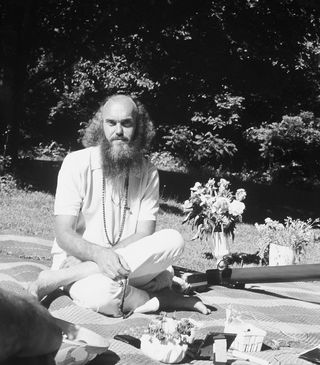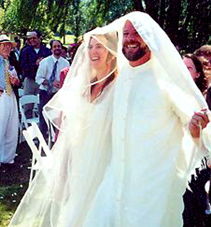Spirituality
Giving Our Power to Teachers
And I don't mean cults; this is more subtle.
Posted May 23, 2018
A number of years ago I was a visiting teacher at the Lama Foundation, a spiritual community in the Sangre de Cristo mountains of New Mexico. I was leading a creativity retreat that included dancing, singing, writing, painting, and theater games.
The residential staff at Lama had a weekly gathering called “Heart Club,” a group process designed to resolve any conflicts simmering between—or within—members. It was facilitated by an old friend of mine, Michael Freeman, who, in addition to being a long-term meditation practitioner and instructor, had also been trained at Esalen Institute as a Gestalt Therapist, and was highly skilled in working intimately with people.
One day a Lama resident approached me with a personal issue he wanted to discuss about his primary love relationship, which had reached a crisis point. As he poured out the details of the entanglement and his confusion about what to do, I was thinking, “I wonder why he is asking me, a creativity teacher, when he has daily access to Michael Freeman, who is really good at helping people with these sorts of things?”
I nevertheless continued listening to this man’s painful story until he talked himself out, and then looked at me expectantly, awaiting my response. I asked him if he had taken his relationship issues to Michael and the Heart Club, but he brushed that suggestion aside, and made it clear that he wanted to hear from me. So I shared with him my precise and exact, truthful feeling in that moment, which was,
“I have absolutely no idea what you should do.”
The following morning, I joined the community for their daily “Tuning Circle” and I listened in amazement as that same guy shared about “the unbelievably powerful advice Eliezer gave me yesterday; it was like talking to a Zen master, he was so clear and direct. I feel completely unburdened after weeks of indecision and turmoil about my relationship.”
It was, to me, a hilarious, and also a bit frightening, example of utter projection onto a teacher. Simply because I was an official “Visiting Teacher,” and would only be there for a few days, he had assigned a specialness to me that I didn’t deserve. Michael, who could have actually engaged with him in an intelligent and useful manner, was, in his mind, simply a fellow Lama resident like himself, and therefore couldn’t possibly have as much to offer as this illustrious, featured guest teacher—me!
The incident was a clear demonstration of the power of projection, similar in some ways to the placebo effect, in that within his personal context of who he defined me to be, he somehow managed to convert my honest confession of ignorance and inability to help him into a profound Zen teaching that cut right through his “stuff” and blew his mind! (Reminiscent of the film, Being There, in which Peter Sellers’ character Chauncey Gardener states, on a TV talk show, a few simple facts about plants and the weather that are interpreted by the host and viewers as profound, coded, national policy directives.)

It dawned on me how easily I could form a cult in which my words and teachings would be held sacrosanct. And as L. Ron Hubbard is alleged to have said when forming Scientology, “Religion is where the money is.” (It is actually very easy to start a cult; for a hilarious read, look to Join Me by Danny Wallace. He simply put a classified ad in the paper saying “Join Me,” without any indication of what exactly it was that people would be joining him in, yet before long, Wallace, whose real name was unknown to his followers, was being referred to internationally as “The Great Leader.”)
Many seekers share this tendency to project onto spiritual teachers, and grant them more wisdom and power, usually, than they actually possess. I have fallen into this trap myself numerous times. When a mere lad of 23, in 1976, I met in a small weekly group with Ram Dass in Boston.

He was bigger than life at that time, sporting a long beard, dressed in white, adorned with mala beads from his guru in India, and was usually barefoot. He was both exotic and exuded a powerful energy of connection and acceptance to each person he encountered, thus earning our love and trust, and we hung onto his every word as if it were emanating directly from the Divine Source. (Even though he himself warned us time and again that, at best, perhaps 50% of what came out of his mouth was possibly on the right track, and since he had no idea which 50% it was, he advised us to only listen to that which rang true in our own experience and dismiss the rest.)
Nevertheless, we generally ignored that admonition and granted all of his words great power and authority, so it is a real testament to Ram Dass’s integrity that he did not exploit that influence for his own gain. Quite the contrary, he steadfastly refused, and still refuses to this day, to ever have any “followers” or “devotees,” and also charged us nothing to attend those meetings with him. Thus, he managed to avoid the great cultish trap.
One day, after our formal group meeting was over, some of us were lingering, and he began spontaneously predicting the trajectory of the path that various people in the room were likely to take as they proceeded on their spiritual journeys. I was sitting shyly off to one side, not even sure he knew I was in the room, when all of a sudden he whirled around in his chair, focused his piercing eyes on mine, and pointing his finger, loudly proclaimed,
“AND YOU ARE NOT GOING TO BELIEVE WHO YOU TURN OUT TO BE!”
I was speechless, awestruck, and very excited. That single, spontaneous remark would churn inside me for the next 30 years, watching and waiting, wondering what he meant, wondering who I would turn out to be. Then, at last, the insight came in my early 50s. I had been raised as a Jewish Prince, instilled with a sense of great Destiny that lay in wait for me. Then that belief was confirmed and amplified by the charismatic, near-Godlike figure of Ram Dass. It was clearly just a matter of time before my fame and fortune would unfold and my glorious mission for humanity would be revealed to the masses.
What dawned on me three decades later, however, was that I had in fact turned out to be a fairly ordinary and normal person, with some successes and some failures, many admirable qualities and some others I wasn’t as proud of. And that’s when it hit me like a wake-up slap in the face: Ram Dass’s prophetic prediction had been exactly spot on:
I couldn’t believe who I turned out to be!
Ordinary. Regular. Is that what he meant? Who knows? I have a strong hunch that he himself didn’t know what he meant, that it just popped out of his mouth, and I, the projecting seeker, gave his statement enough power and importance to fuel 30 years of conjecture.
Similar meaning-charged moments happened to me many times over the course of my 35-year relationship with my dear friend and teacher, the late Gabrielle Roth. (The following anecdotes are excerpted from my forthcoming book from Raven Recording, Heart-to-Heart: Close Encounters with Gabrielle Roth.)

I was having lunch with Gabrielle in New York City one afternoon. That evening she was scheduled to address a conference of 1500 people. On the same night, I was to begin leading a three-day creativity workshop for 12 people. While it could be argued that the intimacy of working with only 12 people might very well be more challenging than delivering a speech to 1500, our conversation nevertheless went like this:
“Are you nervous?” I asked. At first it seemed like she truly had no idea what I was even referring to.
“Oh, you mean about tonight? No, not at all.”
“Because I am terrified of my workshop,” I said. “My heart is in my stomach and I feel like throwing up.”
She looked at me, totally startled, and said,
“Oh gee El, if I felt like that, I would never do this kind of work.”
My teacher-projection and granting-of-power mechanism kicked into high gear and following that weekend, I completely quit leading workshops for over ten years, despite the fact that, without fail, they had always been enormously successful and well-received.
Flash forward a decade or two, and after completing Gabrielle’s 5Rhythms year-long, teacher-training course, she again launched me into the world of leading classes and workshops. My history of intolerable anxiety and fear remained unchanged and I called her one day to confess that merely in order to show up to teach a 90-minute class, I needed to take several Valiums. Fully expecting her to reiterate her comment of some 25 years earlier (that she “would never do this kind of work if I felt that way”), instead she promptly replied, “Well, we really need you out there teaching, so do whatever it takes to get yourself in the room; just don’t go passing out Valium to the participants!”
Wow. I was stunned. It was a total about-face. Yet how could I even be sure I had interpreted her original message correctly? She never directly said I should stop leading workshops; she merely shared that she wouldn’t do that work if she felt the way I did. The implications of a teacher’s words are all in the mind of the beholder, and it would behoove us to recognize, more often than not, that we are likely making all of it up, all of the time.

Gabrielle attended our wedding, and Shari and I invited her to offer a blessing during the ceremony. She said something along the lines of, “Each morning, begin again in the Zero Zone, knowing that you have no idea who it is you’re waking up next to. Your partner is an unknown, a mystery you will never fully know.” Or words to that effect, and in this case, I have found them to be prophetic and true; 20 years later, I still have absolutely no clue as to who Shari really is most of the time, and I remain completely mystified by her. It’s a real Men are from Mars, Women are From a Different Star System in a Distant Galaxy situation.
A few weeks later I was at Gabrielle’s apartment, and when I made some allusion to the wedding, she weighed in, for the first time, about Shari. It was a throwaway line, glancing over her shoulder as she was leaving the room, saying: “She was a safe choice.” Those 1½ seconds became another off-the-cuff remark I have been mulling over for 20 years now.
My first take on it was that she was implying that a safe choice was the wrong choice. After all, she had been training us to be "Spiritual Warriors," and a true Warrior takes risks, and chooses the most challenging path, not the safest one. Then I reframed it for myself, and recognized that for me, with my multitude of life-long anxieties, insecurities, fears and even terrors about living in the world, perhaps my choosing safety in marriage was a good thing, a self-nurturing, positive choice to take care of my frightened, inner child and give my soul what it needed most: a secure and safe home base from which to venture out into the world.
In any case, I never discussed it with Gabrielle, and now she’s gone, and thankfully, Shari’s still here. And I’ve learned that nothing in this always-changing world is ever truly safe anyway. Life leaves us prone to aging, sickness, deterioration and death, not to mention violence, random accidents and a host of other lousy things that can end our lives and those of our loved ones, or, at the very least, make us very miserable with no warning, thus leaving us perpetually anxious and living on edge. On a good day. So a few safe choices couldn't hurt.
A final example. The people who surrounded Gabrielle on the dance floor tended to be fashion conscious. Particularly the women, who adorned themselves with flowing, silky shawls, colorful tights, exotic sarongs and garments from faraway lands like Bali and Nepal. Gabrielle herself was very tuned into the New York City fashion community and was close friends with designer Donna Karan, among others. Of course, most of the straight, male dancers remained pretty committed to their gray sweatpants and ratty tee-shirts most of the time, but there were some of us who enjoyed playing dress-up as well. So after spending many hours combing through some off-the-beaten-track clothing websites originating in Thailand, I ordered what I considered to be very playful and colorful Thai fisherman pants.

The first time I wore them, Gabrielle was leading an exercise in which each participant would identify their “home rhythm,” and join others like them, dancing in the center of a circle. I chose “Lyrical” and pranced into the circle, privately noting that my new prized pants were the perfect expression of that particular rhythm. As our group completed the dance and returned to the perimeter of the circle, Gabrielle commented, “Where’d you get those pants El? They make you look like a little fairy."
Ouch. Stung. Mortified. And I never wore those pants again. Her comment was loaded with layers of meaning for me, none of it consciously intended by her, I'm certain. First, I considered the more literal meaning of the word “fairy”; that is, not necessarily a “femme” homosexual, (not that there’s anything wrong with that!) but rather, a genderless, dancing, mystical sprite that flutters betwixt the trees in magical gardens of fantasy and delight, alongside elves, pixies, and leprechauns. I could live with that, and were not such beings the very embodied essence of Lyrical?
But my inner reaction of hurt and anger persisted, and what came to light for me was a period in my life when I was perhaps eight or nine years old, and each time I went over my friend Dave’s house, I would ring the doorbell, and his menacing, hostile, older brother would answer the door, and greet me with a taunting, maleficent, leering sneer, saying, “Oh hello FAIRY. How are you, FAIRY? Hey Dave, your friend, the little FAIRY is here.” I had no idea what a “fairy” was supposed to be or mean at the time, but the tone of his voice indicated it was clearly something despicable and humiliating, and I would often return home in tears until my father had to intervene and put a stop to it.
That ancient and deeply unpleasant incident got triggered by Gabrielle’s seemingly innocent, passing remark, and I never got the chance, or the courage, to talk to her about it, but it did provide the opportunity for me to look at the early event again and process it more consciously, and hopefully, to finally let it go.
Nevertheless, I still have never worn those pants again.
Thus having a teacher, or being a teacher, is a very tricky dance. I learned from my experiences with Ram Dass, Gabrielle, and the young man at the Lama Foundation, that when I find myself in a leadership position, I have to be very conscious and careful about what messages I am transmitting, though of course none of us are ever able to truly control how students—or anyone, in fact—will choose to hear or interpret our words. But be assured that our words, and the words of our teachers, and friends, loved ones and strangers, along with those of movie stars, athletes, politicians, doctors and cashiers, can and do have a far-reaching impact, for better or worse, in the psyches of those who take them in and manufacture meaning in response to them. It could even be postulated that nearly all of the troubles in our world are, at root, caused by fundamental misunderstandings and misinterpretations in the domain of language.
This morning I read a few passages from Everyday Zen, by the late Charlotte Joko Beck. She was speaking about those teachers whom we elevate to positions of authority, and pointed out that final authority can only be located in our own lives and personal experience. “I’m always amused," she said, "that when a new teacher comes to town, everyone goes running to see him or her. I’ll tell you how far I’d walk to see a new teacher: maybe across the room, no farther! It isn’t because I have no interest in this person; it’s just that there is no one who can tell me about my life except—who? There is no authority outside of my experience.”
By way of closing, please be advised not to believe or accept anything I have written here as being true.




